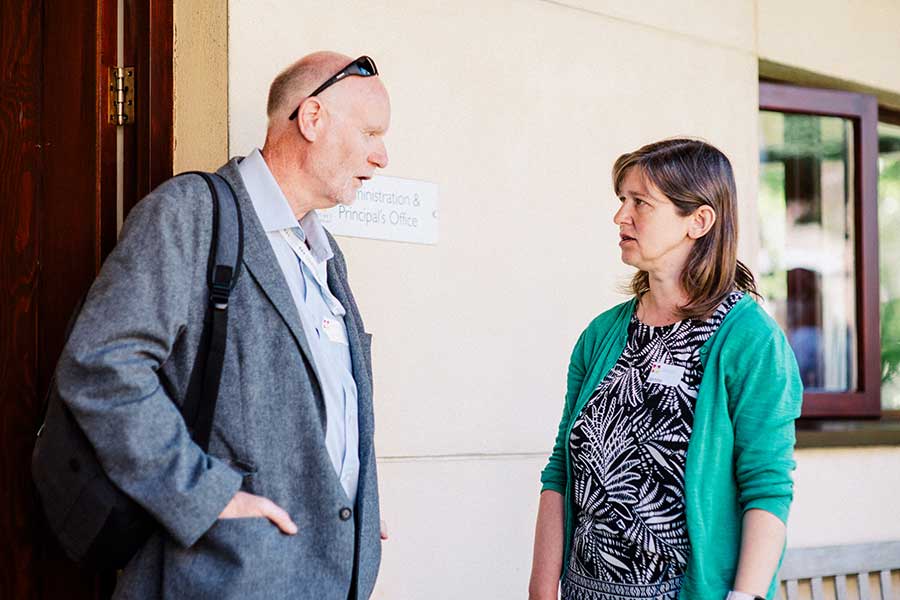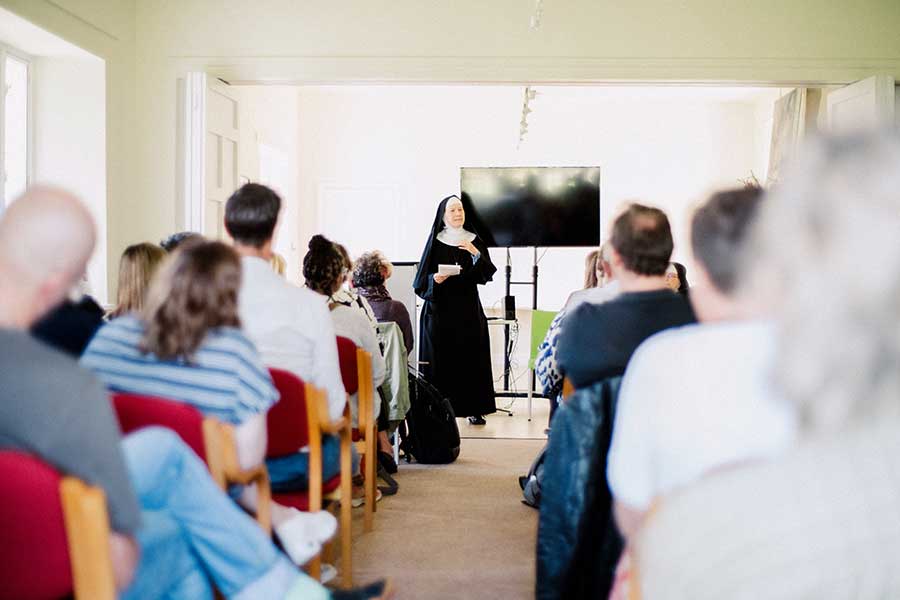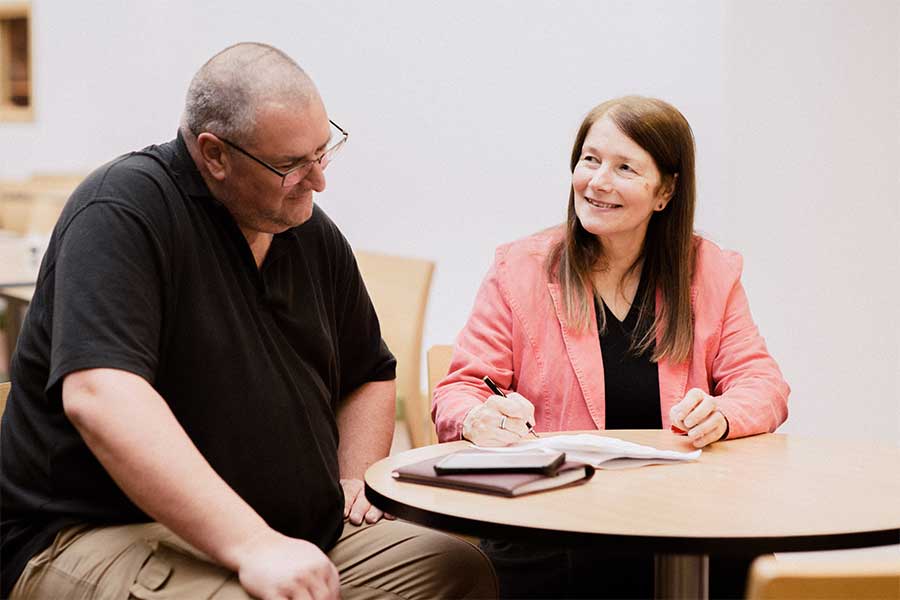
When you’re choosing which theology college to attend as part of your ordination training, there’s a lot to think about.
As a theology college, St Augustine’s is always looking to welcome new ordinands – but we understand that where you choose to train must be the right decision for you.
We’ve broken down some key considerations, and included some useful context on what we, as a theologically college, may have to offer you.
Formation through Anglican ordained ministry training
At St Augustine’s College of Theology, you’ll often hear us talking about the importance of formation.
In the context of ordination, formation describes the journey of transformation you’ll undergo as you prepare yourself for ministerial leadership.
As a theology college, our mission is to help you make that discovery. Formation is deeply personal and, the way we see it, unique to each individual. It’s not about shaping you into being a certain ‘type’ of minister.
True formation is about finding out who you are; who God is calling you to be.
“Formation grows people up faster than anything else: it stretches them and pushes them into shapes they didn’t know they could have. One of the discoveries they make along the way is that stretching doesn’t break them, it develops them.”
– Rev Emma Ham-Riche, who trained for ordination at St Augustine’s
At St Augustine’s, we provide our ordinands with the opportunity to explore personal and spiritual change – crucially, by becoming part of a learning community.
As you engage in theologically reflective practice and spend time with classmates, you’ll find yourself evolving – From unearthing hidden strengths to overcoming spiritual challenges – through comradeship.
When you’re weighing up where to train for ordination, don’t forget to pay close attention to how each college envisions formation for their students – does it match your values, and can they provide the kind of formation experience you’re looking for?
Flexible ordination training with part-time study options
As a non-residential theology colleges, we provide ordinands with the means to study and train – without asking them to live on a college campus.
Students travel to attend classes on campus and afterwards, head home to their families. This allows our ordinands to balance study with their ongoing responsibilities – whether that’s working, looking after children, or caring for a dependent.
As a college, we understand that a standard full-time program of study isn’t for everyone, which is why we offer flexible study options like the ones below.
- Part-time study pathway – Ordination training is spread out over three years; you’ll undertake one module per term, allowing you to balance study with life’s ongoing responsibilities.
- Mixed mode pathway – A full-time program that allows you to complete an ongoing church placement as part of your studies, meaning you’ll attend fewer classes.

As part of your ordination training, you’ll be required to attend classes – however, at St Augustine’s, you have a choice of classroom locations.
Choose from:
- Fortnightly Friday teaching days at our leafy West Malling campus in the Kent countryside
- Weekly Monday evening classes at our handy central London Southwark campus
In some cases, you can even attend class remotely via online classes every Wednesday evening.
“As someone training for self-supporting ministry whilst working full-time, the ability to integrate study with my professional and personal life is essential.”
– Duncan Gray, Part-time ordained ministry student
An inclusive community of ordinands and theology colleges
There’s a reason St Augustine’s is so proud of its vibrant, inclusive student community.
At St Augustine’s, people from all backgrounds and church traditions come together in the same classrooms, enriching one another’s learning experience and contributing to each other’s formation.
“To me, formation is sitting with fellow ordinands, wrestling with theology over a glass of wine. It’s caring, sharing and praying with a group you have come to trust. It’s the whole group mutually supporting one another, showing how the love of Christ is expressed in relationship.”
– Rev Dom de Mattos, who trained for ordination at St Augustine’s
We believe diversity is the key to formation – especially for those undergoing ordination training.
By exchanging ideas with your fellow classmates – perhaps those from a different branch of the Church of England – you expose yourself to new perspectives. This can be an incredibly valuable experience, especially if you wish to learn how to minister with different people and communities.
And while it’s great to celebrate the formational value of our student community, it’s also worth acknowledging just how enjoyable it is to be a part of; whether you’re bending your head in study or standing side by side for worship.
We’re not just proud of our students for what they achieve together – we’re grateful for how they prioritise kindness, inclusivity, and the importance of a warm welcome!
Support with ordination training and study skills
Training for ordination is an admirable, spiritually-enriching calling, but that doesn’t mean academic study can’t pose a challenge.
As part of our student support services, ordinands can choose to work with and seek support from our specialist writing tutor, Suzy Gregory.

Tutor for Writing, Study Skills and Singing Suzy Gregory with theology student Nik Wright.
Suzy works with ordinands on a one-to-one basis, helping you overcome challenges like:
- interpreting essay questions and planning an essay structure
- getting ideas for assignments on paper
- developing study strategies that work for you
- how to turn a draft essay into a finished piece
- how to write academically, in your own style.
Thanks to her experience working with students who are neurodivergent or have learning differences, Suzy can also provide you with some of the support you may need to succeed in academic learning.
“During my studies, Suzy noticed that there was some dissonance between the way I engaged verbally in class and the way I wrote. That insight helped me learn that I was dyslexic: not something you expect to find out in your early middle-age! The team was amazing, and that support is one of the things that really stands out for me as I reflect on my time at St Augustine’s.”
– Beverley, St Augustine’s ordinand from the Rochester Diocese
Alongside personal and pastoral support, St Augustine’s provides ordinands with a practical program of public speech training to help you prepare for ministry leadership.
This optional training program, led by Suzy, is designed to build up your confidence and help you develop your own public speaking style. You’ll be coached on how to:
- speak clearly and engage an audience
- project your voice effectively in different spaces
- develop confidence in speaking to large groups
- avoid slipping into an off-putting ‘clerical voice’.
Training for ordination at St Augustine’s
Each person who is called to ministry follows their own unique path.
Sometimes, it can help to learn in whose footsteps you’re following. We’re very proud of alumni, and we’re honoured to have overseen the ordination training of Church leaders like the Bishop of London, Dame Sarah Mullally.
However, the most important factor in your decision of where to train for ordination is you.
What do you want from your training experience? Who do you want to become – or rather, are you ready to follow your formation to discover who God is calling you to be?
While we hope to welcome you into our community one day, we pray you find a fulfilling and formational training journey wherever you choose to begin.
If you’d like to learn more about St Augustine’s and find out what ordination training may look like for you, we invite you to join us for an “open-day style” Taster Event. Choose a date, time and location that suits you, or speak to our admissions team for more information.

